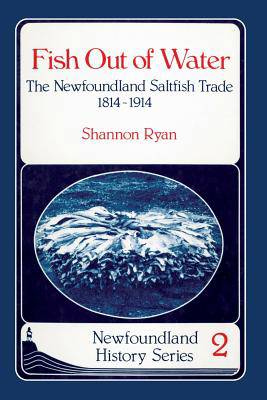
Bedankt voor het vertrouwen het afgelopen jaar! Om jou te bedanken bieden we GRATIS verzending (in België) aan op alles gedurende de hele maand januari.
- Afhalen na 1 uur in een winkel met voorraad
- In januari gratis thuislevering in België
- Ruim aanbod met 7 miljoen producten
Bedankt voor het vertrouwen het afgelopen jaar! Om jou te bedanken bieden we GRATIS verzending (in België) aan op alles gedurende de hele maand januari.
- Afhalen na 1 uur in een winkel met voorraad
- In januari gratis thuislevering in België
- Ruim aanbod met 7 miljoen producten
Zoeken
Omschrijving
Shannon Ryan was bo and received his early education in Riverhead, Harbor Grace. He has studied at Memorial University of Newfoundland (BA (Ed.), BA, MA), the University of London (Ph.D.) and the University of Oslo. He worked for some time as a schoolteacher in Canada and is presently Associate professor of History at Memorial University. His areas of research and publication are Newfoundland fisheries history and Newfoundland oral history. By 1814 the community of Newfoundland had become the beneficiary of a major British economic enterprise-the salt fish industry. Recognition of Newfoundland's status as a crown colony soon to follow and with the granting of responsible gove ment by the mother country in 1855 Newfoundland's political status was among the most advanced in the Empire. However the colony's salt fish trade continued to operate within the network established and maintained by Great Britain and it became increasingly evident that political independence was not to be accompanied by commercial independence. Newfoundland's history during the period from 1814 to 1914 is an important part of the history of North Atlantic Commerce in general and British Commerce in particular. It is also the story of the colony's efforts to grow politically and culturally in the context of the commercial realities of its saltfish trade.
Specificaties
Betrokkenen
- Auteur(s):
- Uitgeverij:
Inhoud
- Aantal bladzijden:
- 344
- Taal:
- Engels
- Reeks:
- Reeksnummer:
- nr. 2
Eigenschappen
- Productcode (EAN):
- 9780919519909
- Verschijningsdatum:
- 1/04/1986
- Uitvoering:
- Paperback
- Formaat:
- Trade paperback (VS)
- Afmetingen:
- 152 mm x 229 mm
- Gewicht:
- 462 g

Alleen bij Standaard Boekhandel
+ 22 punten op je klantenkaart van Standaard Boekhandel
Beoordelingen
We publiceren alleen reviews die voldoen aan de voorwaarden voor reviews. Bekijk onze voorwaarden voor reviews.









